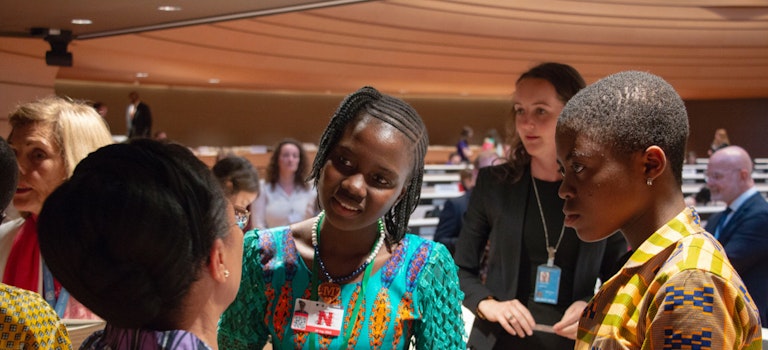 An opinion piece by Anne-Sophie Lois, UN Representative, Head of Office, Plan International Geneva.
An opinion piece by Anne-Sophie Lois, UN Representative, Head of Office, Plan International Geneva.
The COVID-19 pandemic is affecting people across the globe in all aspects of their lives. But one group faces disproportionate consequences that will shape their futures long after the pandemic ends: girls.
Girls endure a double burden of discrimination due to their age and gender. Today’s “new normal” exacerbates this discrimination, threatening our progress towards gender equality.
When the Human Rights Council meets next month to discuss the impact of COVID-19 on the rights of women, it is vital that they consider the specific issues faced by girls.
We need laws and policies that are responsive to different needs according to age, gender, and diversity. And we know, from past emergencies, the specific risks for girls.
How did past health crises affect girls?
Plan International’s report, Living under Lockdown, outlines lessons learned from recent health crises. For example, in Sierra Leone, school closures during the Ebola crisis resulted in a 65% increase in teenage pregnancy.
Women and girls were especially affected by those crises. They missed out most when jobs were lost and schools closed. Economic hardship made many girls vulnerable to exploitation.
Women and girls bore a disproportionate burden of household duties and unpaid care of the sick, heightening their exposure to the virus.
Confinement measures also negatively affected women and girls as levels of gender-based violence increased.
How did the international community respond?
In 2016, with resolution A/RES/71/183, the UN General Assembly (UNGA) recognised “the need to integrate a gender and life-course perspective in the international response to health crises”.
Plan International searched its database for UNGA and HRC resolutions on health crises and, of the 340 we found, this was the only explicit call for an age- and gender-responsive approach.[1]
This resolution is part of the international legal framework that addresses issues affecting women and girls, including gender-based violence, the unequal burden of unpaid care, and access to education.
But the risks for girls due to their age are rarely addressed in hard or soft law. It is even rarer for states to translate international law into policy that, when implemented, addresses girls’ specific needs.
How will COVID-19 particularly affect girls?
We know from experience that girls are likely to face particular challenges.
With widespread school closures, the shift to online learning favours boys who, in low and middle-income countries, are 1.8 times more likely than girls to own a smartphone.
Without school, girls lose the psychosocial support of friends and teachers and access to lifesaving information about their sexual and reproductive health and rights.
When a girl’s education is interrupted, she is less likely than a boy to return, with knock-on effects on her opportunities for employment.
Girls around the world will be more vulnerable to sexual violence, exploitation, trafficking, discrimination, and abuse, both on- and offline. We are likely to see an increase in harmful practices like child marriage and female genital mutilation.
Why do we need policies that address age, gender, and diversity?
These challenges threaten our progress towards gender equality, undermining the 2030 Agenda and achievement of the Sustainable Development Goals.
To understand the problem, we need data that makes visible the specific risks for individuals and groups. To address the problem, we need policies that respond to different needs according to age, gender, and diversity.
In crisis, there is opportunity – the opportunity to build back better, closing socio-economic gaps that predate the pandemic. States should design policies that tackle issues at the heart of gender inequality.
This includes disparities in wealth and earnings, overrepresentation of women and girls in informal employment, unequal access to information, and overcoming the gendered digital divide.
At the root are traditional gender norms that impose certain roles on women, girls, men, and boys.
How policymakers can strengthen their work
To support policymakers, Plan International produced #LanguageMatters, a tool to guide drafting of policy and legislation that leaves no one behind.
Further tools are available on the Girls Rights Platform, including an interactive Human Rights Database where policymakers can search existing language and identify gaps.
Next week, our Geneva office will host a series of 30-minute online sessions to showcase the updated database, demonstrating to diplomats and experts how this tool can facilitate their work at the Human Rights Council.
Further details for the sessions can be found here.
Girls as advocates and agents of change
Girls face particular vulnerabilities, but they are not victims. Around the world, girls are advocates and agents of social change.
Plan International works with many girls and young women who are mobilised to fight for the rights of their communities. Our role is to strengthen their capacity and facilitate access to decision-makers who make policy that affects them.
Initiatives, such as the Girls Advocacy Alliance, foster girls’ activism. In countries such as Ghana, India, Kenya, Liberia, and Uganda, GAA advocates have designed awareness campaigns on the risks of COVID-19 and gender-based violence. They inform their communities and call on decision-makers to keep girls safe from child marriage, exploitation, and violence.
One such advocate in South Asia has been travelling through her community by tuktuk with a loudspeaker and posters, delivering messages to children, young people, and elders about handwashing, cough etiquette, and maintaining physical distance.
If we are to meet the challenges posed by COVID-19, we must work together as equals in global solidarity. Girls are an important partner and we, as the international community, must do everything we can to support girls’ leadership.
[1] Based on a search of the Human Rights Database, hosted on the Girls’ Rights Platform.
Photo credits: Mellicentia, a GAA Youth Advocate from Sierra Leone, participates in the UN Day of General Discussion on the Rights of the Child, Geneva, September 2018 (photograph by May Tachapanich).
